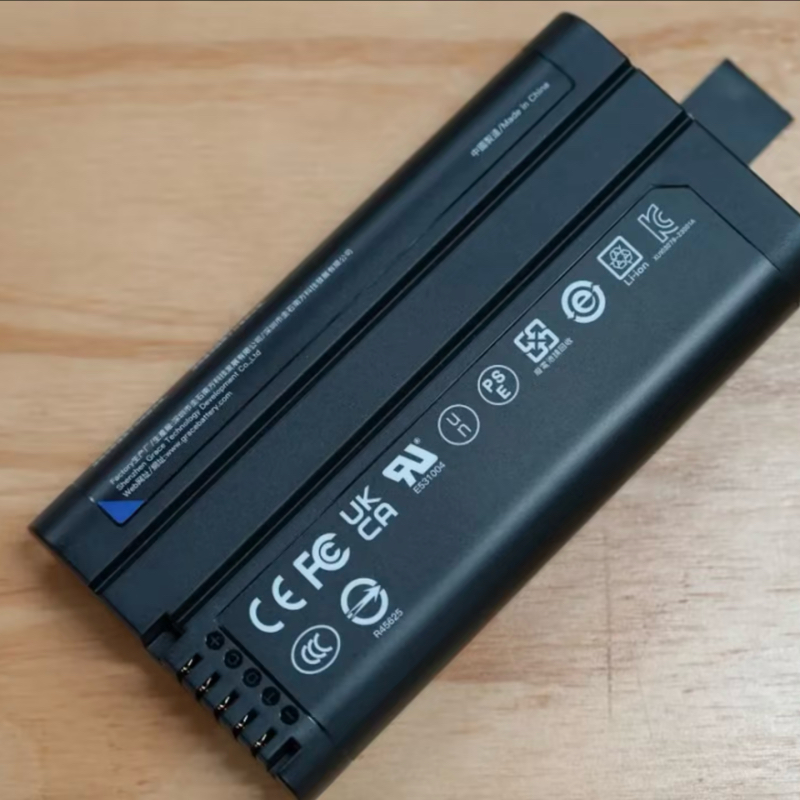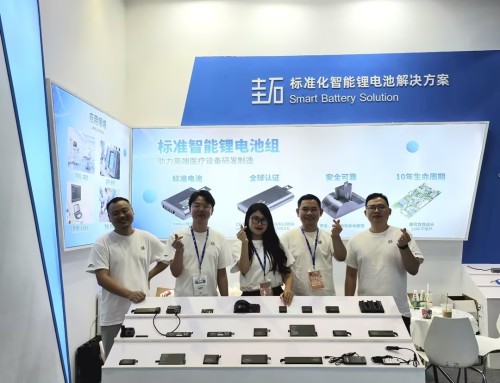Hard Case vs. Soft Case Lithium Polymer Batteries (2025 Guide)
Design and Manufacturing Characteristics of Soft-Case Batteries
Soft-case batteries, as opposed to the two types of hard-case batteries, cylindrical and square, also known as soft-case lithium batteries, are essentially liquid lithium-ion batteries encapsulated in a polymer case. Structurally, soft-case batteries are packaged in aluminum-plastic film, which usually contains a three-layer structure:
– Outer protective layer: generally made of nylon (BOPA) or PET;
– Middle layer: made of aluminum foil, which mainly serves as a moisture barrier;
– Internal layer: a PP layer, responsible for providing insulation and encapsulation.
These structural units are combined with heat-shrinkable plastic to form flexible packages that can be adapted to different shapes and sizes.
In terms of safety performance, when a safety hazard occurs, the most that can happen to a soft-case battery is that it will bulge and crack. It has the advantages of good safety performance, light weight, high capacity, low internal resistance and flexible design.
Design and manufacturing characteristics of hard case batteries
Hard case lithium batteries and soft case lithium batteries are basically the same core formula, the main difference lies in the case material. Hard case lithium batteries use a different encapsulation method, the cell into a rigid plastic box, adding an extra layer of protection for the battery components. This design focuses on toughness, but also increases the weight and size of the battery. Their cases are usually made of ABS or similar plastic, which helps protect against impacts.
Lithium hard case batteries can be subdivided into two types: cylindrical and square. Different encapsulation structures have their own advantages and disadvantages, mainly to meet different market demands. It is relatively difficult to guarantee the consistency of hard-case lithium batteries, and with the increase of models, it is difficult to maintain uniformity in the processing process, so it is more suitable for customized production, which is not convenient for the automated production of lithium battery packs.
When used in high-impact environments, hard-case batteries provide significant protection for lithium polymer (LiPo) power supplies, providing better protection against collisions and punctures, making them ideal for harsh application environments. Soft-case LiPo batteries, on the other hand, are relatively lightweight due to the lack of an additional protective casing.
Basis for choosing between hard-case and soft-case batteries
The choice of hard case or soft case lithium batteries depends on the specific use scenario. RC cars, off-road vehicles and trucks that are often subjected to shock are usually suitable for hard-case lithium batteries. Lithium polymer batteries packaged in soft cases are more heat resistant, lighter in weight, and more flexible, making them suitable for crawling robots, RC airplanes, and other devices. Li-polymer batteries are lighter and more flexible than traditional battery types, which makes them an important power option for RC models, electronic devices and aerial drones.
Size is another key factor. Soft-case battery packs are smaller because they don’t require a bulky external casing, which means a larger mAh capacity can be achieved in the same space. Also, soft-case batteries are better cooled than hard-case batteries, as their thinner external material dissipates heat more easily.
Soft-case batteries are more suitable when weight and space savings are required rather than maximizing durability. Hard case batteries, while compromising on capacity and power potential, are better able to prevent physical damage and withstand environmental factors.
Performance and Durability Comparison of Hard-Case and Soft-Case Batteries
There are significant differences in the way soft-case and hard-case batteries dissipate heat. Soft-case lithium batteries dissipate heat more easily than hard-case batteries, which helps them stay in top shape when they reach their performance limits.
Hard-case batteries have the advantage in terms of protection performance, protecting vulnerable batteries from harsh environments, making them ideal for high-impact usage scenarios. However, this extra protection comes with the disadvantage that hard-case lithium batteries have relatively low power and capacity.
Intelligent battery management systems enable the two types of batteries to exhibit different characteristics. In the soft-case design, users can easily spot signs of battery damage by watching for swelling, while hard-case batteries show signs of damage that are difficult to detect until the casing ruptures, which is critical when the battery is recovering from a crash.
Both types of batteries have their own advantages in terms of durability:
– Advantages of soft-case batteries: lighter weight, smaller size, better heat dissipation, visible signs of damage;
– Advantages of hard-case batteries: increased impact protection, improved resistance to physical damage, suitable for use in rough terrain.
The choice between hard-case and soft-case batteries is essentially a trade-off between protection and efficiency, and the user needs to make a choice based on his or her purpose, location and desired performance.
Pros and cons analysis of hard case batteries vs. soft case batteries
The key to making a reasonable choice between hard case lithium batteries and soft case batteries is to understand the optimal performance of each type of battery, which has its own advantages in different scenarios.
Soft-case LiPo batteries have more advantages: they are lighter than hard-case batteries because they don’t have a bulky protective case, which means that RC cars with soft-case batteries are faster and have a higher mAh capacity; their thin heat-shrinkable packaging dissipates heat better than hard-case batteries; users can detect problems early by checking whether the battery is swollen or not , which is an important safety feature; the power supply and balancing wires connect directly to the battery, which reduces possible points of failure. The power and balance wires are connected directly to the battery, reducing the number of possible points of failure.
However, soft-case batteries also have weaknesses: their fragile surfaces can be easily punctured, torn or damaged in a crash, and even small impacts can jeopardize the integrity of the battery, so careful inspection is required after any crash.
Hard-case lithium batteries are able to withstand crashes and rough handling, and their rugged plastic casing protects the sensitive cells inside, which makes them ideal for high-impact uses such as RC cars, dirt bikes, and trucks, and many race tracks don’t allow the use of any other type of battery for this reason.
Hard-caseed batteries are likewise not perfect: the protective case reduces the capacity and power potential of the battery; of more concern, the hard case can mask the expansion of the battery until the situation is serious enough for the case to rupture, a hidden damage that can lead to the use of damaged batteries, which in turn can damage the system in question.
RC aircraft such as helicopters, airplanes, and multi-rotors often use soft-case batteries because weight is critical for this type of equipment; ground vehicles, which are often subjected to impacts, are better protected with hard-case batteries. Some RC tracks will have sand buckets on hand to quarantine any suspect batteries, regardless of type.
The choice should be based on specific needs, considering whether you need lighter weight and better performance, or additional crash protection.
Best scenarios for hard-case vs. soft-case batteries
RC enthusiasts face important decisions when choosing a power source for their vehicles, and the right type of battery has a direct impact on performance and safety for all types of applications.
Advantageous Scenarios for Lithium Hard Case Batteries
Hard case batteries are best suited for RC ground vehicles. RC cars, buggies, and trucks can be subjected to impacts while traveling, and these impacts can damage unprotected batteries. These types of vehicles have a higher probability of traveling over rough terrain, impacts, and crashes, and therefore require additional protection. Hard-case lithium batteries are able to withstand moderate impacts and rough handling, whereas soft-case batteries fail quickly in such situations.
It makes sense for racing venues to require hard-case battery packs, and many tracks require competitors to use hard-case batteries to avoid accidents. Hard-case batteries increase reliability in the following scenarios:
– Electric and hybrid electric vehicles;
– Stationary energy storage systems;
– Medical devices requiring high reliability;
– Aerospace applications requiring safety and reliability.
Physical impact risk is an important consideration, and any RC model that is subject to collision or impact will be better protected with a hard-case battery.
Advantageous scenarios for soft-case lithium polymer batteries
Soft-case batteries are mainly used in aviation applications. RC vehicles such as helicopters, airplanes, and multi-rotor drones do well with soft-case lithium polymer batteries because weight reduction is critical for these devices, and every gram of weight lost helps to improve flight time and maneuverability.
Soft-case batteries are well suited for the following consumer electronics:
– Cell phones and smartphones;
– Tablets and laptops;
– Wearable devices such as smartwatches;
– Portable power supplies.
Ground vehicles with protected battery compartments can safely use soft-case batteries, and some RC cars and trucks are already equipped with adequate physical battery protection, so an additional hard case is not required.
Comparison table between hard case and soft case batteries
|
Characteristics |
Hard case lithium batteries |
Soft Case Lithium Batteries |
|
Construction |
Hard plastic or metal case |
Three-layer aluminum-plastic composite film |
|
Weight |
Heavy due to protective case |
Lightweight without additional case |
|
Heat dissipation |
Slower cooling performance |
Excellent thermal management |
|
Protective |
Excellent impact resistance and durability |
Easy to tear and puncture |
|
Size |
Bulkier design |
Compact and space-saving |
|
Capacity |
Lower capacity due to housing space |
Store more mAh in the same space |
|
Damage detection |
Damage is not detected until it is severe |
Quick visual inspection shows battery expansion |
|
Optimal applications |
RC cars, buggies, trucks, race tracks |
Airplanes, helicopters, drones, electronics |
|
Manufacturing |
Reliable production standards |
Rigorous requirements with varying results |
|
Wiring |
Standard connections |
Direct soldered connections |
|
Safety features |
Meets track requirements |
Clear damage indicator |
|
Heat management |
Limited by housing design |
Excellent heat distribution |
Conclusion
The choice between hard or soft case lithium batteries depends on the specific usage requirements. Hard-case batteries offer good protection and are best suited for ground vehicles where collisions and bumps are likely to occur, while soft-case batteries are lighter in weight and better cooled, making them ideal for weight-sensitive flying machines.
Regardless of which type of lithium polymer battery you choose, safety should be a top priority. Hard-case batteries protect against collisions, but can hide dangerous battery expansion; soft-case batteries allow users to easily spot battery problems, but are more prone to punctures or tears. Therefore, whichever case type of battery you choose, it needs to be handled with care.




